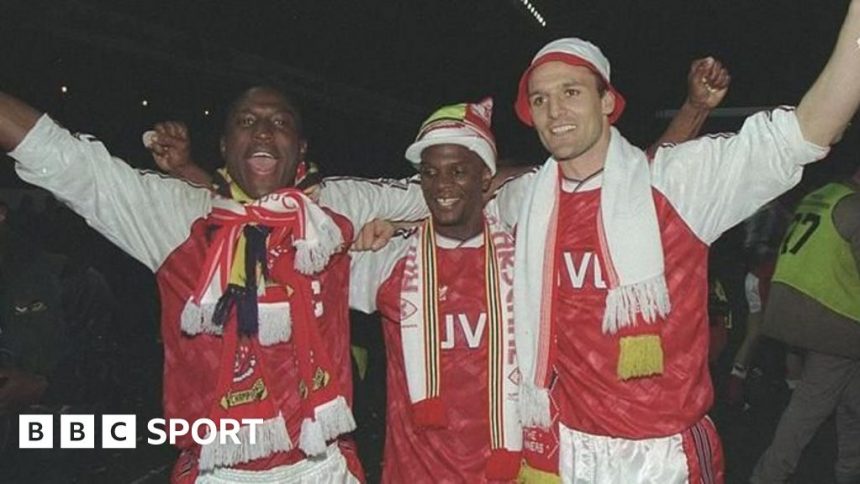Campbell mixed finesse and power with big personality
Kevin Campbell obit
-
Published
Kevin Campbell was a striker who mixed finesse, power and finishing ability to great effect during a career in which he played a prominent role at several clubs.
Campbell, who has died aged 54, is perhaps best known for his time at Arsenal, where he was a First Division title winner in 1991, and won the FA Cup and League Cup double in 1993 before playing in the European Cup Winners’ Cup final win over Parma the following year.
The other high spot of Campbell’s career came when he joined Everton on loan from Turkish side Trabzonspor in March 1999 to end a nightmare spell in Turkey, scoring nine goals in eight games to help Walter Smith’s side avoid relegation.
He became an enduringly popular figure at Everton for scoring the winner in a 1-0 Merseyside derby win at Anfield in September 1999. It was to be 22 years before the Toffees won there again, ensuring Campbell’s permanent place in the affections of the blue half of Merseyside.
Born in Lambeth, Campbell came to prominence in the youth ranks at Arsenal, winning the FA Youth Cup in 1988 and once scoring 59 goals in a single season at that level.
He often played in the shadow, at least when measured by his profile, of forwards such as Alan Smith, Paul Merson and latterly Ian Wright, but Campbell’s adaptability, versatility and team ethic, allied to his natural striker’s instinct made him a vital component of manager George Graham’s successes at Highbury.
The flowering of Campbell’s Arsenal career came after loan spells at Leyton Orient, who he helped to promotion from the Fourth Division in 1989, then at Leicester City in Division Two before returning to the Gunners and truly coming into his own.
Campbell scored eight goals in 10 games during the run-in as Arsenal won the title in 1990-91 in what was an era of rebirth for the Gunners under Graham.
Kevin Campbell (left) scored nine goals from 20 appearances as Arsenal won the old First Division title in 1990-91
He was sold to Nottingham Forest in a £2.5m deal in the summer of 1995, though Forest were relegated at the end of his second season there.
However, Campbell then scored 23 goals in a devastating partnership with Pierre van Hooijdonk as Forest romped back to the Premier League at the first attempt – only for supporters to be stunned when the club then agreed to sell Campbell to Trabzonspor.
Van Hooijdonk effectively went on strike for a period, in protest at the departure of Campbell – who scored 36 goals in 88 appearances for Forest – and eventually returned to the Netherlands with Vitesse Arnhem.
Campbell’s spell in Turkey ended in controversy and unhappiness when then Trabzonspor chairman told journalists after a heavy home defeat by Kocaelispor: “We bought a cannibal who calls himself a striker.”
Despite claims of a misunderstanding, Campbell said at the time: “This is the biggest insult I’ve had in my life. Nothing, no apology, can heal the injury. It would be better if I was allowed to leave with my pride.”
Campbell was well-liked by his team-mates and fans in Turkey but the Premier League came calling once more in the shape of a struggling Everton side, who he helped to avoid relegation before joining permanently in the summer of 1999.
He remained at Everton for more than five seasons as a mainstay, first under Smith then his successor David Moyes. He is Everton’s fifth highest Premier League scorer with 45 goals, netting 51 times in 164 appearances in all competitions for the club.
Campbell played an important role in the development of Wayne Rooney after he burst on the scene as a 16-year-old at Everton, acting as the experienced, reliable and streetwise guiding hand to the brilliant young firebrand.
He had earlier performed a similar role with Francis Jeffers when he came through at Everton before going on to play for Arsenal and England.
After Campbell’s winning goal at Anfield in September 1999, Everton never won another away Merseyside derby for 22 years
He left for West Bromwich Albion on a free transfer in January 2005, the season in which the Baggies pulled off what is still known as “The Great Escape” at The Hawthorns, becoming the first team in Premier League history to stay up after being bottom of the table at Christmas.
Campbell, who won four England Under-21 caps and one England B cap despite never making the full international side, retired after a short spell at Cardiff City.
Away from football, Campbell formed a record label called 2 Wicked in the latter stages of his time at Everton, and following his retirement took part in humanitarian work visiting refugees in Iraq and Africa.
He was proud of the successes of his son Tyrese, who has played for Stoke City in recent seasons.
Campbell also worked as a pundit and was a regular visitor to his former clubs, where his warm and open personality meant he was always welcomed with open arms.
He was happy to engage with fans, whether out on the streets before games at Emirates Stadium or Goodison Park, or as a regular special guest on the highly popular “The Highbury Squad” podcast.
Campbell was a player and a man who never lost touch with his roots.
West Bromwich Albion were Campbell’s last Premier League club, before bowing out with a spell in the Championship at Cardiff
-
-
Published14 May
-






